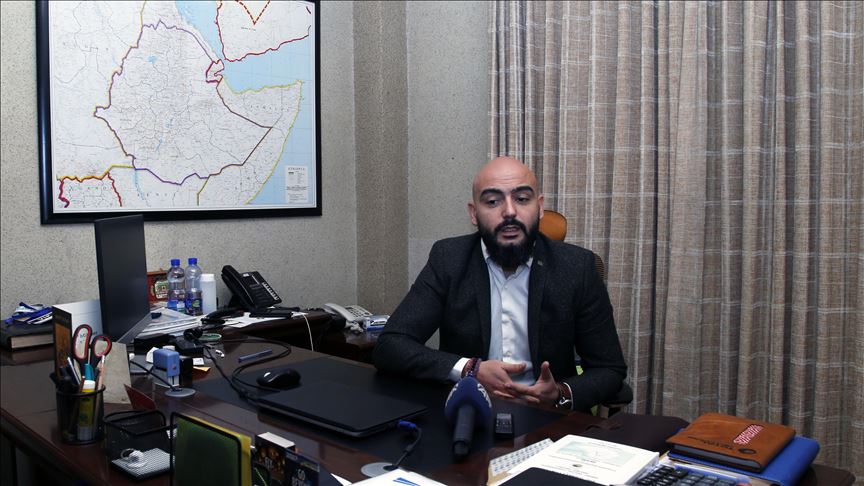 Murat Ocal, the representative of the country manager, speaks to Anadolu Agency during an interview in Addis Ababa, Ethiopia on January 16, 2020.
Murat Ocal, the representative of the country manager, speaks to Anadolu Agency during an interview in Addis Ababa, Ethiopia on January 16, 2020.
ADDIS ABABA, Ethiopia
It was business as usual on a bright weekday morning in the city of Adama, located 100 kilometers (62 miles) southeast of the Ethiopian capital Addis Ababa.
Motorists who cross the city constantly blare horns while cruising to and from the capital and other regions.
However, there was calm and order on the premises of Etur textile Plc, a Turkish integrated textile factory that was built in 2010 in Adama.
The Ethiopian, Turkish, Oromia regional state and Etur flags are blowing in the morning wind.
Inside the building, men and women operate and supervise the machines that transform waste from textile factories to fibers, fabrics, and garments.
Osman Basoglu, the general manager of Etur textile, told Anadolu Agency that the company was the first in Ethiopia manufacturing at par with global recycling standards.
"Our export destinations are mostly U.S.A. and Europe," he said.
"But there is a huge market demand in Africa that could benefit all in many ways."
He noted that the company has been receiving export enquiries from many countries from the Common Market for Eastern and Southern Africa (COMESA).
The 21-member-state trade bloc is duty free and quota free.
"As Ethiopia has not yet joined COMESA, our potential buyers are discouraged by the price of our products that are heavily taxed," he said.
Railway construction
In bustling Addis Ababa, another Turkish company has established its headquarters.
Yapi Merkezi, a construction giant, is building a railway line in Ethiopia and Tanzania.
Murat Ocal, the representative of the country manager, told Anadolu Agency that these projects will impact the economies of both countries.
The Ethiopian project, Awash-Kmbolcha-Hara Gebya is a 400-km (248-mi) railway designed to connect northern, central and eastern Ethiopia to the port of Djibouti.
Yapi Merkezi signed a $1.7-billion phased construction agreement with the Ethiopian government in 2012.
"The construction of the first phase started at the end of 2014, while the second phase commenced 13 months later due to the financial arrangements of the Ethiopian government,” Ocal said.
"So far, we have reached an overall completion of 93% of the two phases of the project," he noted.
"The state of the art railway will increase the volume of Ethiopia’s export. Undoubtedly, the movement of goods and people will enhance economic integration, harmony, and peace.’’
Yapi Merkezi’s Tanzanian railway project is another chapter of African economic interconnection.
The construction of the fastest 1200-km (745-mi) rail line which stretches from Dar Es Salaam to Victoria lake would connect Uganda, Rwanda, the Democratic Republic of Congo, Tanzania and provide access to the Indian Ocean.’
Turkey’s largest Africa investment
Turkey has made its largest Africa investment in Ethiopia which amounts to $6 billion.
Mekonen Hailu, director of public relations with the Ethiopian Investment Commission, told Anadolu Agency that currently, there are more than 150 Turkish companies engaged in construction, manufacturing, agriculture, and chemical, among others.
"Turkey is the second-biggest investor in Ethiopia with an investment capital of $2.5 billion. To date, the companies have created jobs for more than 30,000 Ethiopians," he added.
"The excellent relations between Ethiopia and Turkey is the most fundamental factor that made Ethiopia become a preferred destination for Turkish investors," Hailu said.
According to him, Ethiopia’s abilities in attracting foreign direct investment (FDI) was the other factor behind the investment flow.
Basoglu is optimistic that the serious shortage of foreign currency that impeded the import of raw materials, problems related to export logistics and political stability, would be solved.
"I am confident that Ethiopia’s economy will be stable, this country will be the rising star of foreign investment," he added.








